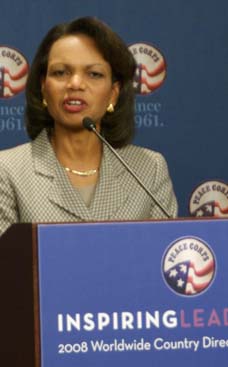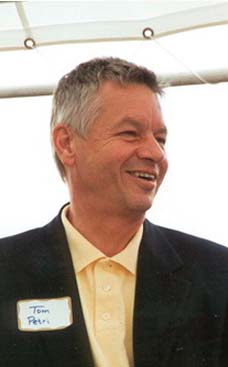
Lurie, a former Peace Corps volunteer, drew upon her experiences and set the story in Peru during the time of the Shining Path guerillas. “My theory was that terrorism is much like an illness,” she said. “You don’t know who is going to be dead or alive in the morning. It is the same sense that your world is turned upside down.” She added, “The cries of the children in the book are not from the Andes but the NYU pediatric neurology ward.” Rewriting the novel meant brushing up on her Spanish and studying the 2,000 pages of testimonies from the Peruvian reconciliation commission hearings, mostly accounts of villagers in the Andes. Lurie served as a volunteer in Ecuador, but recalled visiting Lima, the capital of Peru, during the early 1980s. “The Shining path was really active in Lima,” she said. “There were blackouts and you couldn’t go out after six o’clock.”
Ecuador RPCV Lynn Lurie took six years to write her novel, “Corner of the Dead" about Peru's Shining Path
Novelist writes of social unrest in South America
Thursday, May 29, 2008
By HARRY TRUMBORE
Lynn Lurie took six years to write her novel, “Corner of the Dead.”
“When I was writing the first draft, I would very diligently go to the Millburn library and lock myself in one of the little cells upstairs while the kids were in school,” she said.
The novel, which won the Juniper Prize for Fiction, was published this spring by University of Massachusetts Press. It tells the story of a young aid worker in South America during a recent period of social upheaval.
But, according to Lurie, the impetus for the book was something quite different.
“The first draft was about a sick child,” she said.
Lurie had begun writing about her experiences when her son, Barnett, was seriously ill in a New York hospital. After the first draft was finished, she believed no one would want to read it.
So Lurie, a former Peace Corps volunteer, drew upon her experiences and set the story in Peru during the time of the Shining Path guerillas.
“My theory was that terrorism is much like an illness,” she said. “You don’t know who is going to be dead or alive in the morning. It is the same sense that your world is turned upside down.”
She added, “The cries of the children in the book are not from the Andes but the NYU pediatric neurology ward.”
Rewriting the novel meant brushing up on her Spanish and studying the 2,000 pages of testimonies from the Peruvian reconciliation commission hearings, mostly accounts of villagers in the Andes.
Lurie served as a volunteer in Ecuador, but recalled visiting Lima, the capital of Peru, during the early 1980s.
“The Shining path was really active in Lima,” she said. “There were blackouts and you couldn’t go out after six o’clock.”
There was little violence in Ecuador at the time, but she said that even in that more stable country she witnessed land takeovers.
“It was the time of revolutionary theology of the Catholic church,” she said.
She strived to make “Corner of the Dead” historically correct and interviewed a journalist who covered the conflict.
“I probably am a very political person,” Lurie said. “I didn’t want to take the side of either the government or the Maoist guerrillas but just portray the violence. The brutality of those sides was equally horrific.”
She has returned several times to South America as a translator and organizer of medical teams. Working with Healing the Children, an organization that sends volunteer doctors to care for impoverished children, Lurie has had the opportunity to bring healing to a land she loves.
“We bring all of our equipment,” she said “It has to be cleared through customs ahead of time.”
The medical teams often work to repair cleft palates and aid burn victims.
“Many of the children live in tarp houses and the parents are out working when a fire occurs,” Lurie explained.
One trip, Lurie accompanied an opthomologist and he worked a minor miracle.
“There was a girl, 13, brought in by her mother,” Lurie remembered. “They had walked two days to get to the clinic. The girl had gone blind from one day to the next and was kicked out by her father who thought it was a devil possessing her. She had cataracts.”
During upcoming trips, Lurie wants to rebuild the local hospital that was damaged in last August’s earthquake.
“Any proceeds from my book are going to towards that,” she said.
She has been back to visit the village where she lived as a Peace Corps volunteer and she brought along her son.
“I wanted to take Barney because I felt like he was part of the story,” she said.
For past two years Lurie has taught a Fairleigh Dickinson University in Madison. She teaches a humanities survey course, “Perspectives on the Individual.”
“I want students to think about how to behave and be more compassionate,” she said. “I hope they will become part of the solution.”
For now, she is putting teaching aside to concentrate on her next novel. She has a solid first draft and said, “What I want to do is lock myself in a room for a year.”
Her new book, originally set in Argentina, is a story about child abuse — “Lolita from the perspective of Lolita,” she explained.
“It has a social purpose,” she said, then laughed, remembering how her first effort had changed. “It could be totally different in a year,” she added.









